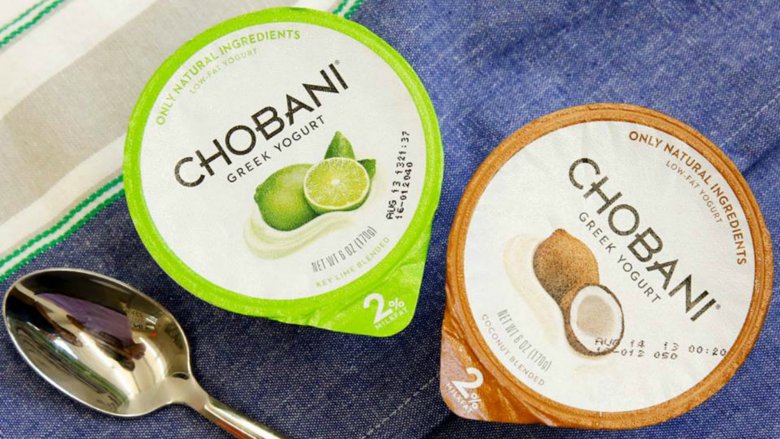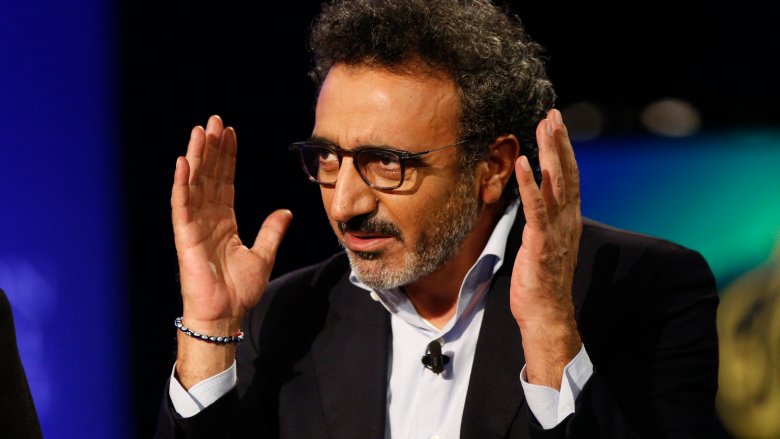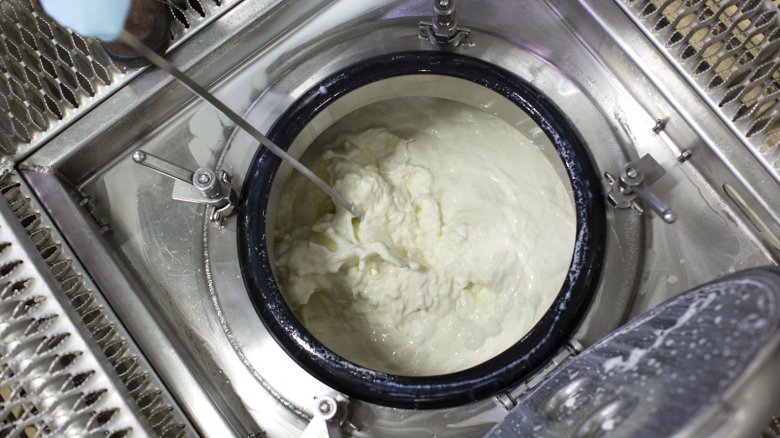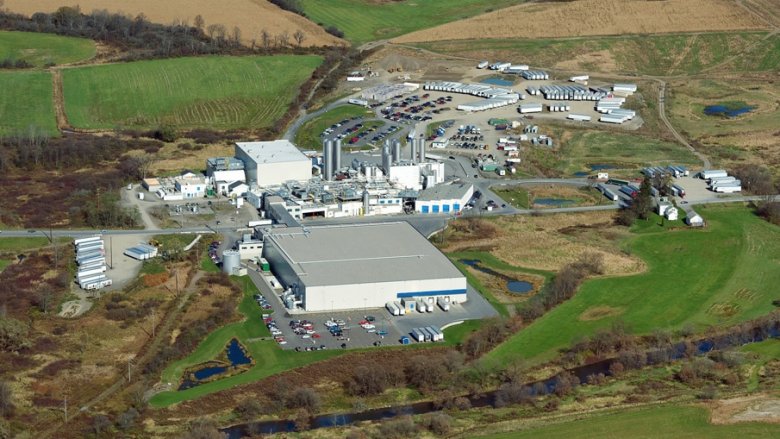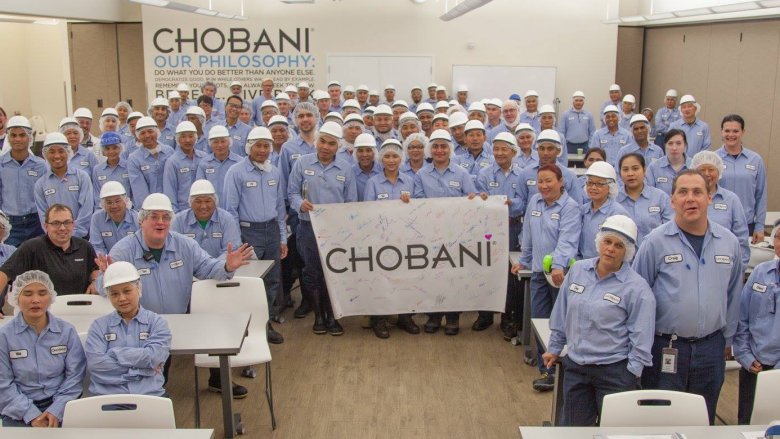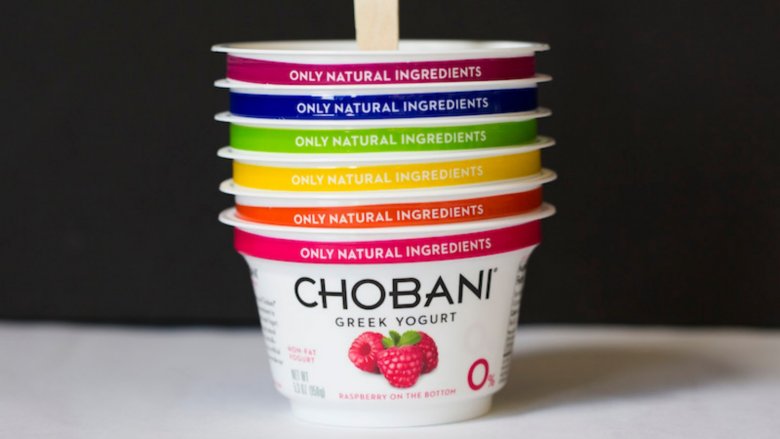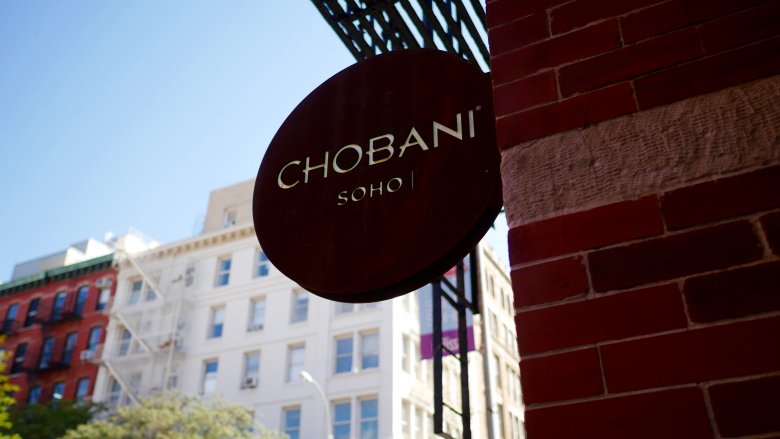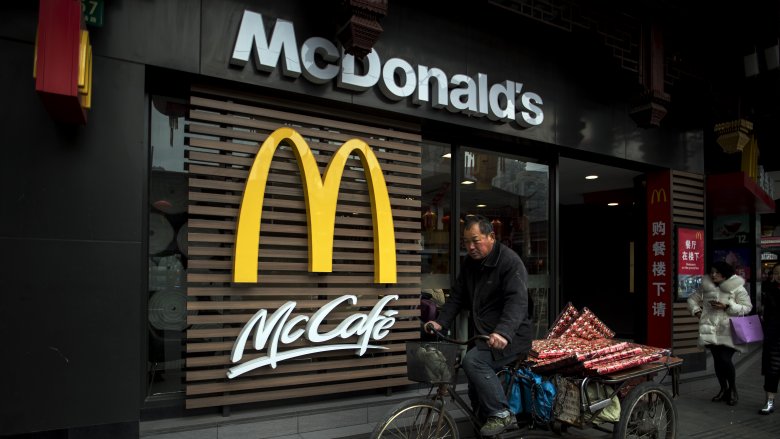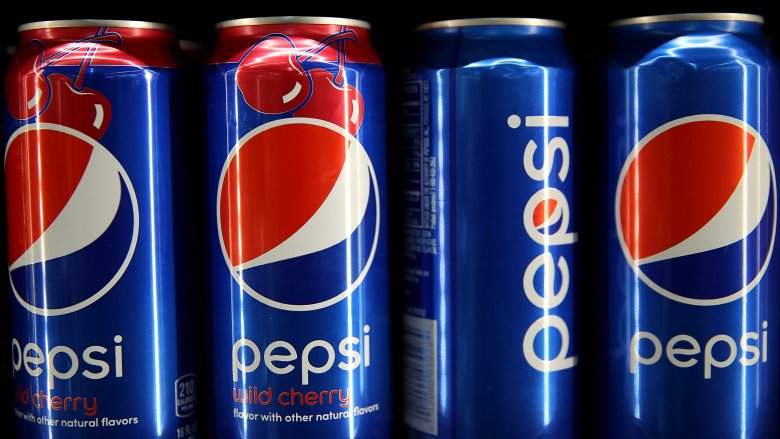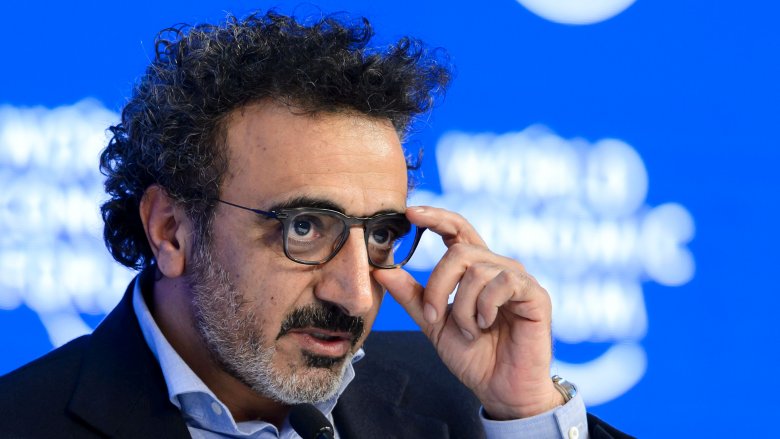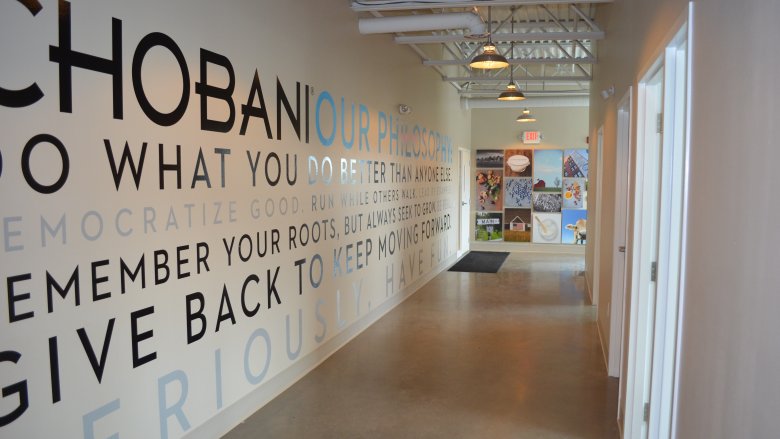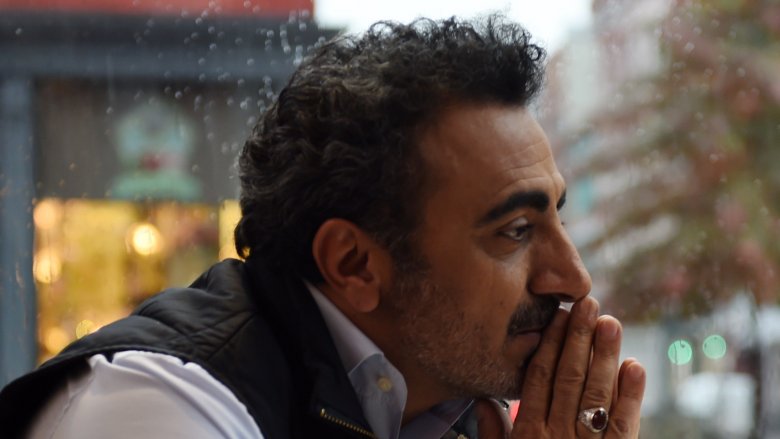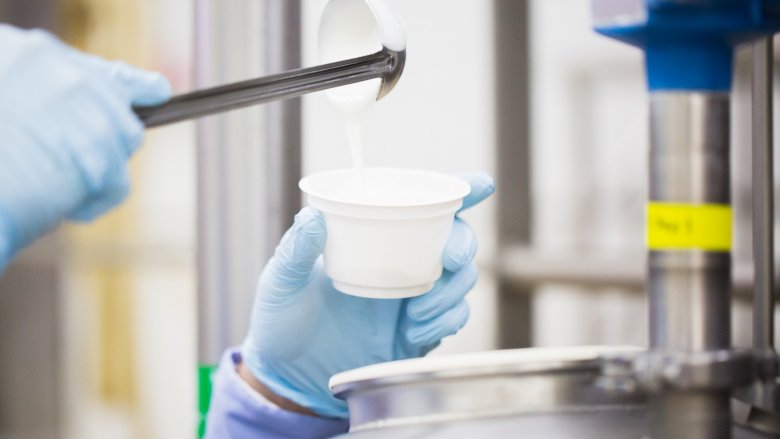The Untold Truth Of Chobani
When you think of innovative companies that grew fast and raked in billions of dollars, names like Google and Facebook immediately come to mind. But surprisingly, you don't have to revolutionize social networking or information sharing in order to join the ranks of the billion dollar business elite. Rather, you can build an empire by making a high quality cup of yogurt and selling it for a reasonable price, which is exactly what Chobani founder Hamdi Ulukaya did a little over ten years ago. And this yogurt company with humble origins has been making the headlines ever since, shaking up the industry one spoonful at a time. So how did they rise to the cream at the top? Here's what you need to know about Chobani.
The founder was born a sheepherder
The American dream is alive and well for Hamdi Ulukaya, who was born into a Kurdish sheepherding family in eastern Turkey. They were nomadic, bringing their sheep and goats to graze on mountainsides in the summer months, where Ulukaya was birthed by a midwife — which is why he doesn't know his exact birthday. He emigrated to the United States when he was 22, with no friends and no competency in English, after he was questioned by Turkish authorities over his involvement in Kurdish rights groups. Over a period of ten years, he finished his education and started a small business, and in 2005 he took out a loan and purchased a defunct yogurt factory in New Berlin, New York, from Kraft Foods. Then, with a small group of employees (most of whom had been laid off by Kraft), he built up the business of Chobani, one case of yogurt at a time. Today the business is worth billions.
It started with feta cheese
Before Ulukaya became America's yogurt king, he worked selling another kind of dairy product, one familiar to his family: feta cheese. The idea came about during a visit from his father, who was underwhelmed by the feta selection available in the states, so he encouraged his son to go into business. That's when Ulukaya started his first company, Euphrates. Initially, he imported and distributed his family's cheeses, and later, he manufactured his own from cow's milk in a small factory in upstate New York. It took several years and non-stop work, but within a few years the business moved into the black. That's when he received a piece of junk mail advertising a large factory for sale, which kicked his aspirations into a higher gear.
They've revitalized depressed rural areas
When the dairy factory that Ulukaya would eventually buy first hit the market, it was still being operated by Kraft with a skeleton crew of 55 employees, and was on the verge of being decommissioned. That's not an uncommon event in the rust belt, which suffered near-economic collapse as industry declined in the region. So Chobani's success has been a boon to the small town of New Berlin, New York, where the first Chobani factory is located, providing sustainable jobs both inside and outside of the factory. Additionally, the real estate market has improved because of people moving into the region for work. The company even built a baseball stadium for the local little league teams, something the town was lacking. And in Twin Falls, Idaho, Chobani's second factory has breathed new life into the economy as well.
They hire refugees
Ulukaya has often expressed his support for refugees, which is not surprising given the persecution he faced in his native Turkey for being Kurdish. He told WWLP, "I left Turkey because I was Kurdish and was very serious about Kurdish rights...there are Kurds there that left because their human rights were violated, their villages were bombed." So he gets it. But he's not just empathetic of their plight — he also actively hires refugees at his factories, citing them as model employees. He told 60 Minutes, "The minute they get a job, that's the minute they stop being a refugee... They are the most loyal, hard-working people right now in our plant here." Additionally, Ulukaya has donated significant monies to refugee causes — and pledges to eventually give away most of what he's earned to help refugees in need.
They support LGBT rights
Chobani has a pretty solid record of showing up for LGBT rights. For one, they spoke out against Russia's anti-gay laws during the 2014 winter Olympics in Sochi, joining co-sponsors Devry and and AT&T in their support of equality. They also showed their support on Twitter, incorporating gay pride colors into an advertisement. Additionally, they featured a lesbian couple in one of their advertisements as part of their Love This Life campaign. And they're aware that they're putting their money where their proverbial mouth is. Peter McGuinness, Chobani's chief marketing and brand officer, told Ad Age, "We've been an inclusive brand from the beginning and equal rights has been fundamental and foundational for this brand. The founding mission of Chobani was better food for more people. Good food shouldn't be a privilege, it should be a right, and we want to make it available to all." That's some solid support.
They have brick and mortar cafes
You might not know this if you don't live in New York City or the greater Houston metropolitan area, but Chobani has branched out into the restaurant business. So far they have three locations, wherein they serve a variety of menu items that, not surprisingly, feature yogurt in some way. And while one of the locations is free-standing, one is housed inside of a Target store in New York, and the other is nestled within the confines of a Walmart store in Texas. It will be interesting to see what other corporations they pair up with next.
They tested with McDonald's
Chobani might not be an official partner of McDonald's (yet), but they've certainly worked together before. In 2016, they banded together when McDonald's started using Chobani's fat-free vanilla yogurt in all of their yogurt-based dishes. That change also meant that their fruit and yogurt parfait and McCafe smoothies would featured nonfat yogurt instead of the low-fat yogurt they were previously using.
McDonald's does have an established partnership with Yoplait, who supplies them with the yogurt they use in their kid's meals. Perhaps in the future there's room for more than one yogurt company at the Golden Arches, but for now, it looks like the partnership didn't work out. McDonald's no longer lists Chobani as an ingredient in their smoothies or parfaits.
They turned Pepsi down
One company Chobani will likely not be working with anytime soon is PepsiCo Inc. That's because Chobani turned down the beverage mogul's offer to become a large investor in the company. While they were interested in selling a portion of their company, they weren't looking to sell a majority stake, which is what PepsiCo was after. For Chobani, a move like that would mean that they'd have to relinquish their independence — something they consider an important asset that they're not willing to give up.
PepsiCo wasn't the only beverage giant interested in investing in Chobani, as Coca-Cola was in talks with them, as well. However, Coca-Cola ended the talks and walked away, stating that Chobani was not the "right fit" for their portfolio.
They got death threats
Hamdi Ulukaya employs thousands of people at his two Chobani factories, both citizens and refugees alike. But his outspoken verbal and financial support of refugees has drawn considerable ire from opponents who believe that he's trying, as The New York Times reported, to "drown the United States in Muslims." These opponents also took to social media to level racist insults and Ulukaya and his company, and most egregiously, threaten the life of the mayor of Twin Falls, Idaho, where Chobani has a factory. The New York Times attributes the source for much of this harassment to be Breitbart, a right-wing media outlet that published misleading stories about Chobani, subsequently angering their consumer base and spurring them into hateful action.
They sued Infowars
Breitbart isn't the only outlet that's critical of Ulukaya and his company. Far-right commentator and conspiracy theorist Alex Jones at Infowars has also made inflammatory comments about Chobani, including the now-retracted headline "Idaho Yogurt Maker Caught Importing Migrant Rapists," according to the Los Angeles Times. It was this material that prompted Chobani to take legal action against Jones, filing a defamation lawsuit that demanded the content be removed, and that more than $10,000 in damages be paid. According to the lawsuit, Chobani felt the article "caused and continue[s] to cause harm to Idaho residents, including Chobani employees, their families and other members of the Twin Falls community." Both Jones and Chobani settled the lawsuit, and Jones issued an apology and a retraction.
The founder's ex-wife sued them
The lawsuit against Alex Jones was not the only legal battle that Chobani has dealt with. In 2012, Ulukaya's ex-wife, Dr. Ayse Giray, sued the company, claiming she had invested half a million dollars in Ulukaya's previous business, feta cheese company Euphrates. For that investment, she sought a 53 percent share of Chobani, which was at the time valued at approximately $2 billion. The lawsuit was eventually settled in 2015, though no details were included in the settlement.
There's a waste byproduct
You might not think of yogurt as something that can damage the environment, but manufacturing it on such a huge scale does have potential for environmental impact. That's because Greek yogurt is made via a straining process — it takes four pounds of milk to make one pound of yogurt — so naturally, there's a lot of leftover liquid to dispose of — a liquid called whey. Companies like Chobani, then, end up paying either municipalities or farmers to take the byproduct off their hands, sometimes hauling the whey long distances to ensure it's properly used or disposed of. Additionally, in 2014, Chobani implemented a program in their Idaho factory that filters out the water and increases the concentration of the whey, and uses the recycled water for sanitation purposes. Not only are they off-loading less waste product, but they're using less water, too.
